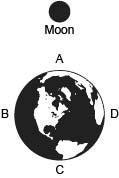
Chemistry, 19.02.2020 01:50 dulldiamondss2858
Ca(OH)₂(s) precipitates when a 1.0 g sample of CaC₂(s) is added to 1.0 L of distilled water at room temperature. If a 0.064 g sample of CaC₂(s) (molar mass 64 g/mol) is used instead and all of it reacts, which of the following will occur and why?
(the value of for Ca(OH)₂ is 8.0 x 10⁻⁸)
(A) Ca(OH)₂ will precipitate because Q > .
(B) Ca(OH)₂ will precipitate because Q < .
(C) Ca(OH)₂ will not precipitate because Q > .
(D) Ca(OH)₂ will not precipitate because Q < .

Answers: 3


Another question on Chemistry

Chemistry, 21.06.2019 17:00
What is the empirical formula of vanadium 1 oxide given that 20.38 grams of vandium combines with oxygen to form 23.58 grams of the oxide
Answers: 1

Chemistry, 22.06.2019 11:30
Determine the reaction and balance the following equations urgent due in the morning
Answers: 2

Chemistry, 22.06.2019 18:30
What volume of a 0.0606 m solution of strontium bromide is needed to obtain 0.340 mol of the compound? question 42 options: a)5.61 l b) 3.4 l c) 600 ml d) 1 l e) 178 ml
Answers: 1

Chemistry, 23.06.2019 00:30
Arrange the elements in order of increasing electronegativity. use the periodic table to you arrange the elements. p o k mg
Answers: 2
You know the right answer?
Ca(OH)₂(s) precipitates when a 1.0 g sample of CaC₂(s) is added to 1.0 L of distilled water at room...
Questions

Mathematics, 04.02.2021 22:10

Mathematics, 04.02.2021 22:10


English, 04.02.2021 22:10

Mathematics, 04.02.2021 22:10

Mathematics, 04.02.2021 22:10


History, 04.02.2021 22:10

Mathematics, 04.02.2021 22:10

Biology, 04.02.2021 22:10




Mathematics, 04.02.2021 22:10


English, 04.02.2021 22:10

Arts, 04.02.2021 22:10



Mathematics, 04.02.2021 22:10




